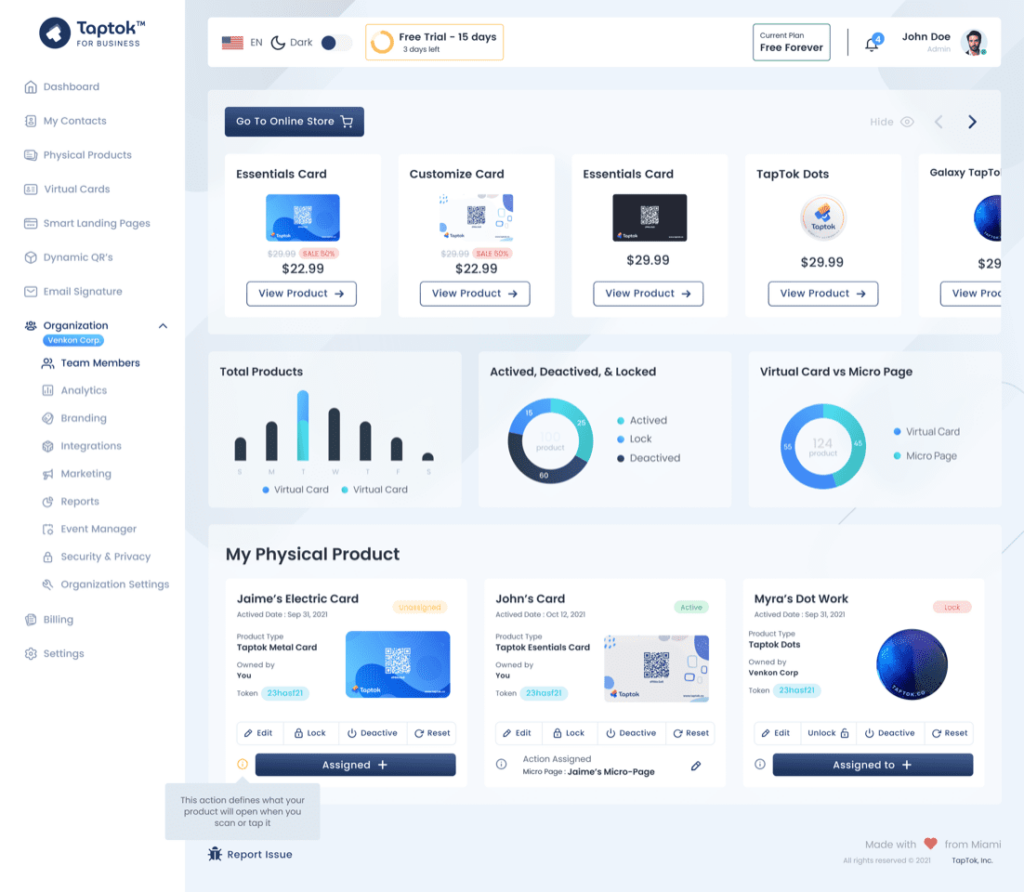By Riley Kaminer
Perhaps there is no more iconic element of business culture than the calling card. From Patrick Bateman’s bone white business card to a Japanese salaryman’s meishi, cards are a constant across many cultures and industries.
But in an increasingly digital-first era, what’s the value of a business card? And how can first-time founders and seasoned executives alike best convert their IRL connections into business opportunities?
Jaime Manteiga, founder and CEO of Miami-based TapTok, has developed a hybrid digital-physical solution to ensure that you present yourself well whenever you make a new contact.
The startup’s main product is a thin piece of metal that resembles a top-tier credit card. To share your contact info, simply place the card alongside your new contact’s phone. Immediately, a message will appear, directing your new contact to a webpage with all your relevant contact details. Users create this page directly within TapTok and can also share it by simply sharing the link – no card contact necessary. Once users pay for the card (starting at $29.99), they get free access to the digital platform.
The origins of TapTok stem from Manteiga’s work as a cybersecurity expert. He was learning about an update from Apple that would open up their phones’ near-field communication (NFC) protocol – the technology underpinning Apple Pay.
“At first, I thought that it could be a little dangerous for my clients,” he told Refresh Miami. “But then I realized that the protocol was safe and open to many other things, like sharing websites and social media links.”
Thus, TapTok was born. Manteiga created a prototype and started showing it off to some of his enterprise clients. After some positive feedback, he realized he had something. Along the way, Manteiga partnered with Janse Lazo, who became the company’s COO.

TapTok’s early growth also coincided with the pandemic, when people began to watch what they touched. In that context, the startup’s contactless solution was a no-brainer. And it’s only grown from there. The company reports having upwards of two million card taps or link views per month.
“The viral effect of this product is amazing,” noted Manteiga. Networking events provide ‘superspreader’ events for TapTok, he explained, with people deciding to purchase the cards after experiencing them through a current user sharing a tap.
According to Manteiga, another feature keeping clients hooked is TapTok’s analytics dashboard, which helps users take a data-driven approach to networking. It shows information like how many new leads they have gotten over time, and how many messages they’ve received from new contacts.
Environmental responsibility is top of mind for TapTok, underscored Manteiga. Apart from the obvious benefits of buying one card once rather than an endless supply of paper cards, the company uses Microsoft’s carbon-neutral servers. The product is recyclable, and the team has plans to start using recyclable materials for its packaging as well.
On top of the card, TapTok also sells “dots,” or phone grips that stick to your phone and enable you to share your information in the same way. Going forward, the startup plans to expand their range of digital and physical products. While details are still under wraps, Manteiga hinted that TapTok is looking to expand into the hospitality space, enabling restaurants to more effectively interact with their guests.

READ MORE ON REFRESH MIAMI:
- This Miami startup’s credit card-sized charger will make sure you’re never out of juice
- Is your phone battery about to die? Miami startup Chargefon has an on-the-go solution for you
- Education saved these Cuban founders’ lives. Now they’re building an EdTech startup to give back
- The hottest technology in Miami? Exowatt raises $20M, launches renewable energy solution - April 22, 2024
- This Earth Day, let’s shine a spotlight onSouth Florida innovators building a greener world - April 22, 2024
- Dataplor’s $10.6M Series A will help usher in the next generation of global location intelligence - April 22, 2024





